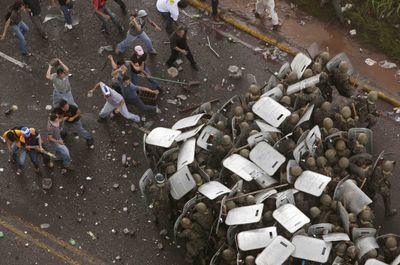World leaders critical of Honduran coup

TEGUCIGALPA, Honduras – Police and soldiers clashed with thousands of protesters outside Honduras’ national palace Monday, leaving at least 45 people injured, as world leaders from Barack Obama to Hugo Chavez demanded the return of a president ousted in a military coup.
President Manuel Zelaya said he would seek to return to his country Thursday and reclaim control of the government. He said he would accept an offer from the head of the Organization of American States to accompany him to Honduras.
Across Latin America, leftist leaders pulled their ambassadors from Honduras and Nicaraguan President Daniel Ortega said El Salvador, Nicaragua and Guatemala would cut trade with neighboring Honduras for at least 48 hours. Venezuelan President Hugo Chavez called for Hondurans to rise up against those who toppled his ally.
“We’re ready to support the rebellion of the Honduran people,” Chavez said. He later vowed to halt Venezuelan oil shipments to Honduras and called for its soldiers to rise up against “that tyrannical, puppet government.”
Protests outside the presidential palace grew from hundreds to thousands, and soldiers and police advanced behind riot shields, using tear gas to scatter the protesters. The demonstrators, many of them choking on the gas, hurled rocks and bottles as they retreated. At least 38 protesters were detained, according to human rights prosecutor Sandra Ponce.
Red Cross paramedic Cristian Vallejo said he had transported 10 protesters to hospitals, most of them with injuries from rubber bullets. Officers also briefly detained four journalists from the AP and three from Venezuela-based Telesur. In Washington, Obama said the United States will “stand on the side of democracy” and work with other nations and international groups to resolve the matter peacefully.
Honduras’ new government, however, was defiant. Roberto Micheletti, named by Congress to serve out the final seven months of Zelaya’s term, vowed to ignore foreign pressure and began naming Cabinet members, including a new minister of defense.
Despite the protests at the palace, daily life appeared normal in most of the capital, with nearly all businesses open.